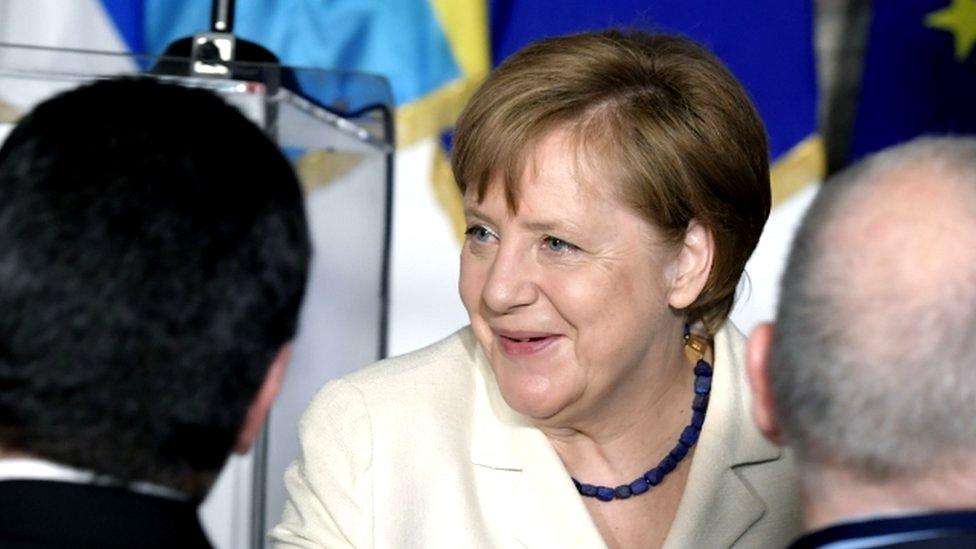Germany's Merkel eager for victory in Schulz's opposition heartland
- Published
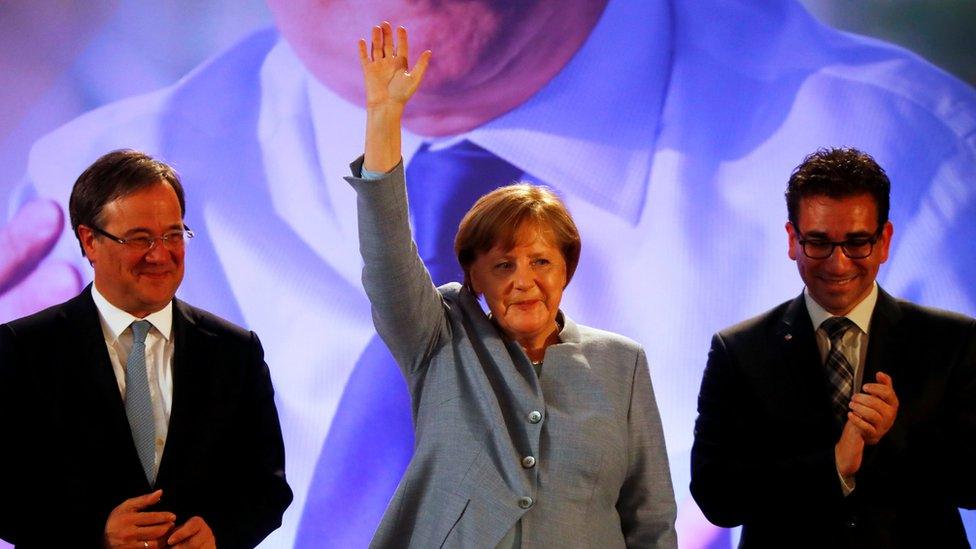
Mrs Merkel's Christian Democrats (CDU) have a real chance of winning in Germany's most populous state
Under the wooden beams of Brilon's medieval hunting lodge, Angela Merkel sweeps past a gleaming brass band to address her party faithful.
Voters here have yet to make their choice in the regional election. But already there's something of the victory march in the chancellor's step.
It has been years since her party won here in Germany's most populous state.
Sunday's vote in North Rhine-Westphalia is the last ahead of the general election in September. And it is viewed as a bellwether.
This is Social Democrat country. The centre-left SPD currently rules in coalition with the Greens but polls suggest that could be about to change.
In recent weeks Mrs Merkel's centre-right Christian Democrats (CDU) have been closing in and support for the SPD has dwindled. The rivals are now neck-and-neck in the polls.
It is not often that a German regional election is considered so important.
Has Merkel's rival lost his spark?
Martin Schulz, the charismatic SPD leader, has thrown down the gauntlet. If his party wins here, he declared recently, he will be the next German chancellor.
It is a statement he may live to regret.
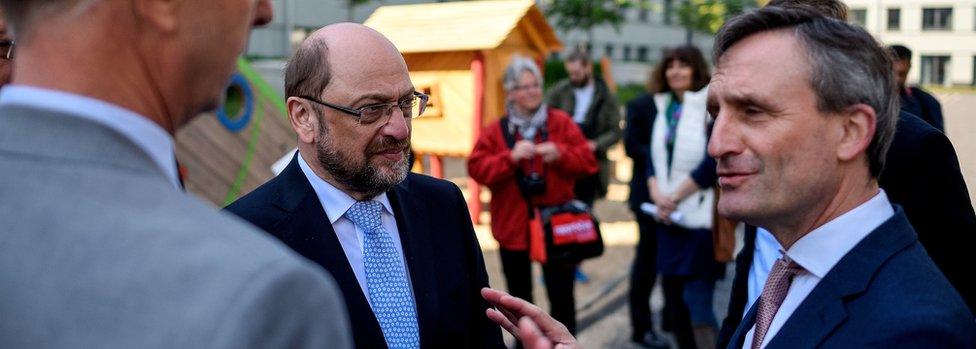
Support for the SPD climbed when Martin Schulz (C) took charge, but has declined recently
When Mr Schulz, ex-president of the European Parliament, returned to domestic politics there was an immediate surge of support in the polls for his party.
The CDU looked on nervously as commentators noted for the first time in years that Mrs Merkel was no longer unchallenged in her bid for a fourth term in the chancellery.
But since then the Social Democrats have suffered two humiliating electoral defeats at the hands of Mrs Merkel's conservatives, in regional votes in Saarland and, last Sunday, in Schleswig-Holstein.
The party has slipped in the national polls and, even here in the SPD heartland, the so called Schulz effect appears to have dwindled.
"His approval ratings will only stabilise once he says very clearly what he wants to do," says Brilon's SPD mayor, Christoph Bartsch.
"In the eyes of the voters that hasn't happened yet. We need a clear programme and clear policies on topics which matter to the electorate."
Where family firms count
Here the issues that matter include internal security and the economy.
On security, the CDU's candidate for North Rhine-Westphalia has promised to make the state the envy of other German regions.
There is a powerful industrial lobby here.
On the edge of town, under a chimney smoking into the clouds, huge lorries deliver logs to the sawmill.
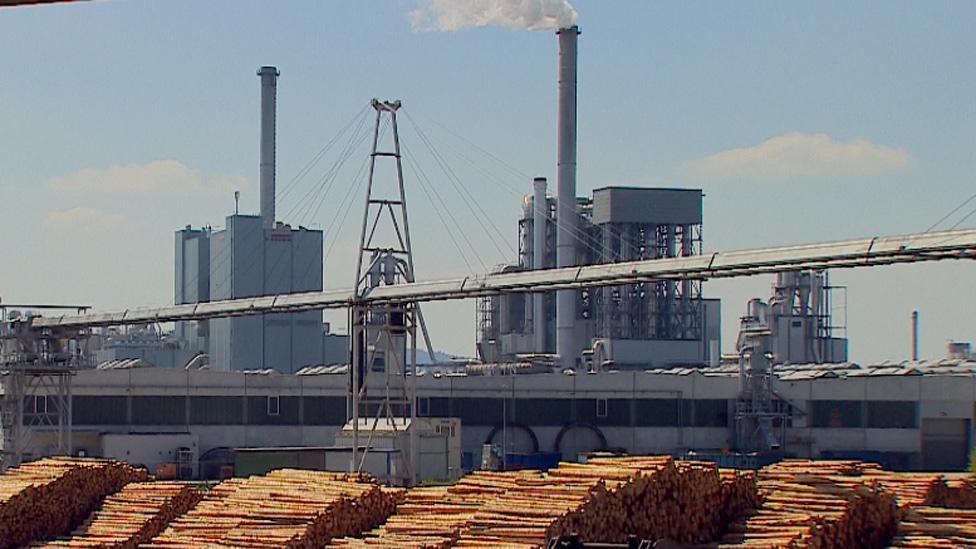
Germany's industrial heartland lies in North Rhine-Westphalia
Martin Ansorge, finance officer at Egger wood processing, tells me that Germany's next chancellor will need the support of what Germans call the Mittelstand - medium-sized family firms.
"We need to cut bureaucracy, we need a modern education system, we need support for businesses in the digital future, and we need a better infrastructure in this region," he says.
Mr Ansorge will not discuss his preferred choice of party or candidate, and Germany as a whole has four months left to make up its mind.
In Brilon's market square, among the flower stalls and vans selling fish rolls, one enterprising pub was advertising "Schnitzel Angela Merkel" in honour of the chancellor's visit to the town.
Few of the diners seemed tempted, and the cost of €19.54 (£16.50, $21) - presumably chosen to reflect Mrs Merkel's birth year - was perhaps a little steep.
"I think she really will be chancellor again," said one stallholder. "She's very self-assured, reliable and calm. And she's a woman - I like that."

The chancellor may have refused to take the baton but still hopes to lead Germany
An elderly man nearby wasn't convinced. "She promised too much and invited too many people without asking us. She wasn't thinking properly and too many bad people came to the country."
Later, the rally finished, Angela Merkel posed for pictures with the band.
She laughed as she refused to take the baton from the conductor.
But make no mistake, this woman wants German voters to continue dancing to her tune.
Unless Martin Schulz finds a way of reversing his fortunes, they may well do so.
- Published19 March 2017
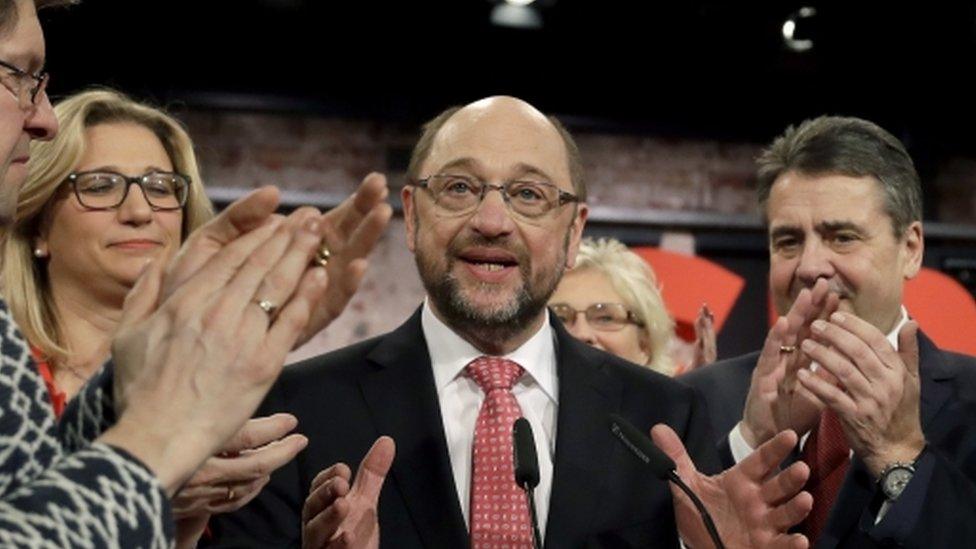
- Published26 March 2017
